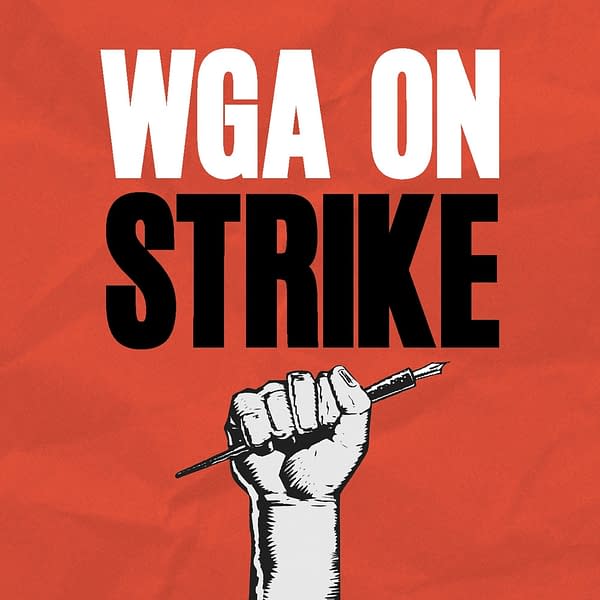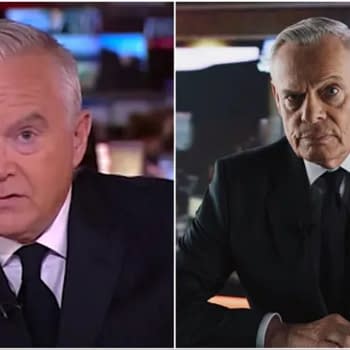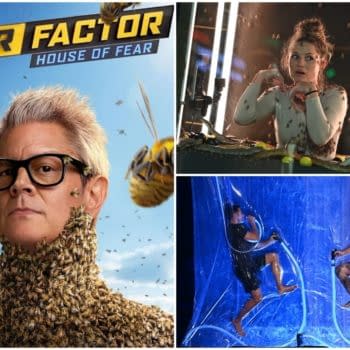Posted in: Opinion, TV, TV | Tagged: ai, plagiarism, screenwriters, six feet under, streamng, wga, writers guild of america, writers' strike
The WGA Must Keep Reminding Everyone "AI Screenplays" Are Plagiarism
For the WGA, AI is a very real problem for screenwriting as a livelihood, with AI-generated "screenplays" being nothing more than plagiarism.
If you're reading this, you're probably familiar with the main points of the Writers Guild of America's (WGA) strike. The WGA strike is important to the profession of screenwriting because television networks have been undercutting the ability of screenwriters for television to make a living writing for television. Shorter seasons and smaller writers' rooms mean reduced pay. Streaming services gaining prominence means that residuals aren't really getting paid because writers don't really know how often their shows are being repeated or how many are watching them. Hollywood is gradually turning screenwriting from a profession into a gig, a hobby that's unsustainable as a proper job. The biggest existential threat to the profession that should be at the forefront that impacts payments and residuals in the long term, however, is Artificial Intelligence.

Many screenwriters and producers have heard that heads of studios and networks are looking forward to having AIs write first-draft screenplays and then hire human writers at a reduced price to rewrite those screenplays into drafts that are coherent and ready for production. (For the sake of clarity, we're going to call the scripts "screenplays" so that you don't mistake them for alphanumerical computer code that gets called "scripts.")
WGA Striker: Screenwriters Know About AI Problem
One of the bigger – probably the biggest – sticking points in negotiations is the WGA demanded that AI should be regulated so that it "can't write or rewrite literary material, can't be used as source material" and that writers' work "can't be used to train AI." The AMPTP rejected this proposal – they do not want to make any commitments regarding this issue yet, which has concerned those whose livelihoods and future depend on being properly compensated for their creative output. Residuals are just the icing on the cake. AI-generated screenplays will have a huge impact on writers' residuals if AI is going to be used by studios to write screenplays.
The Guardian spoke to TV writer Rick Cleveland, who had written on Six Feet Under and The West Wing, who pointed out, "[The use of AI in scriptwriting] is straight-up plagiarism because it only knows what it's being fed, and all of the choices it makes would be taken from what people actually wrote, but they won't discuss it with us. One executive said he looks forward to the day that scripts are written by AI."
AI-generated screenplays are literally writing-by-numbers. They throw together words and sentences from pre-existing screenplays that were written by humans to create a composite screenplay. That means AIs study and grab words and sentences from screenplays available in online and digital databases from any and every movie and television show you can think of: Chinatown, Justified, Succession, The West Wing, The Sopranos, The Wire, 30 Rock, The Office, Seinfeld, The Godfather, Casablanca, The Flash, Arrow, Blue Bloods, ER… literally any screenplay that has a digital copy out there on a server accessible to an AI via the internet or a company server. All these screenplays were written previously by humans. An AI would be stealing their words, their sentences, to write a composite screenplay it has been asked to write. If a human did that, it would be plagiarism and a legal issue. How is an AI doing that not the same thing? And if a studio or network gets their AI to do that, how is that not plagiarism? It is literally stealing from other – human – writers.
Do Studios and Networks Want Plagiarism in Their Optics?
The studios and networks will be able to claim they are the authors of the screenplays, and the writers revising them might not get credit, which means they would get no residuals in future showings of the movie or television show. It's another way to destroy screenwriting as a profession. Executives and CEOs don't care. They only care about making maximum profit and sharing as little of it as possible. And do the studios and networks really want the optics of their entire industry generating plagiarised content? How will that look to Wall Street and the shareholders?
We can't say this enough: AI-written screenplays are PLAGIARISM. They are literally writing by numbers. The WGA strikes need to put this on their placards: "AI WRITING IS PLAGIARISM."














